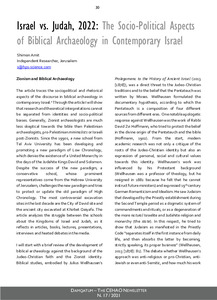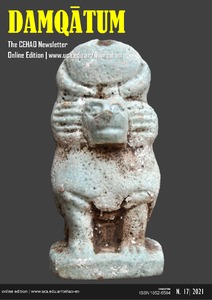Por favor, use este identificador para citar o enlazar este ítem:
https://repositorio.uca.edu.ar/handle/123456789/17808| Campo DC | Valor | Lengua/Idioma |
|---|---|---|
| dc.contributor.author | Amit, Shimon | es |
| dc.coverage.spatial | Israel | es |
| dc.date.accessioned | 2024-02-29T12:02:16Z | - |
| dc.date.available | 2024-02-29T12:02:16Z | - |
| dc.date.issued | 2021 | - |
| dc.identifier.citation | Amit, S. Israel vs. Judah, 2022 : the socio-political aspects of biblical archaeology in contemporary Israel [en línea]. Damqatum. The CEHAO newsletter. 2021 (17). Disponible en: https://repositorio.uca.edu.ar/handle/123456789/17808 | es |
| dc.identifier.issn | 1852-6594 | - |
| dc.identifier.uri | https://repositorio.uca.edu.ar/handle/123456789/17808 | - |
| dc.description.abstract | Resumen: The article traces the sociopolitical and rhetorical aspects of the discourse in biblical archaeology in contemporary Israel.1 Through the article I will show that research and theoretical interpretations cannot be separated from identities and socio-political biases. Generally, Zionist archaeologists are much less skeptical towards the bible than Palestinian archaeologists, pro-Palestinian minimalists or Israeli post-Zionists. Since the 1990s, a new school from Tel Aviv University has been developing and promoting a new paradigm of Low Chronology, which denies the existence of a United Monarchy in the days of the Judahite Kings David and Solomon. Despite the success of the new paradigm, a conservative school, whose prominent representatives come from the Hebrew University of Jerusalem, challenges the new paradigm and tries to protect or update the old paradigm of High Chronology. The most controversial excavation sites in the last decade are the City of David site and the ancient city excavated at Khirbet Qeiyafa. The article analyzes the struggle between the schools about the Kingdoms of Israel and Judah, as it reflects in articles, books, lectures, presentations, interviews and heated debates in the media. I will start with a brief review of the development of biblical archaeology against the background of the Judeo-Christian faith and the Zionist identity. Biblical studies, embodied by Julius Wellhausen’s Prolegomena to the History of Ancient Israel (2013 [1878]), was a direct threat to the Judeo-Christian traditions and to the belief that the Pentateuch was written by Moses. Wellhausen formulated the documentary hypothesis, according to which the Pentateuch is a composition of four different sources from different eras. One notable apologetic response against Wellhausen was the work of Rabbi David Zvi Hoffmann, who tried to protect the belief in the divine origin of the Pentateuch and the bible (Hoffmann, 1902). From the start, modern academic research was not only a critique of the roots of the Judeo-Christian identity but also an expression of personal, social and cultural values towards this identity. Wellhausen’s work was influenced by his Protestant background (Wellhausen was a professor of theology, but he resigned in 1882 because he felt that he cannot instruct future ministers) and expressed 19th century German Romanticism and Idealism. He saw Judaism that developed by the Priestly establishment during the Second Temple period as a dogmatic system of commandments and rituals, or as a degeneration of the more natural Israelite and Judahite religion and monarchy (the state). In this respect, he tried to show that Judaism as manifested in the Priestly Code “separates itself in the first instance from daily life, and then absorbs the latter by becoming, strictly speaking, its proper business” (Wellhausen, 2013 [1878]: 81). The debate whether Wellhausen’s approach was anti-religious or pro-Christian, anti-Jewish or even anti-Semitic, and how much his work was an expression of German Romanticism and Idealism, continues to this day (Kratz, 2009). | es |
| dc.format | application/pdf | es |
| dc.language.iso | spa | es |
| dc.publisher | Pontificia Universidad Católica Argentina. Facultad de Ciencias Sociales. Departamento de Historia. Centro de Estudios de Historia del Antiguo Oriente | es |
| dc.rights | Acceso abierto | * |
| dc.rights.uri | http://creativecommons.org/licenses/by-nc-sa/4.0/ | * |
| dc.source | Damqatum. The CEHAO newsletter. 2021 (17) | es |
| dc.subject | ARQUEOLOGIA BIBLICA | es |
| dc.subject | ESTUDIO LITERARIO | es |
| dc.subject | INTERPRETACION TEXTUAL | es |
| dc.subject | SOCIOLOGIA DE LA CULTURA | es |
| dc.subject | ASPECTOS POLITICOS | es |
| dc.subject | HISTORIA DE ISRAEL | es |
| dc.subject | EXCAVACIONES ARQUEOLÓGICAS | es |
| dc.title | Israel vs. Judah, 2022 : the socio-political aspects of biblical archaeology in contemporary Israel | es |
| dc.type | Artículo | es |
| uca.disciplina | HISTORIA | es |
| uca.issnrd | 1 | es |
| uca.affiliation | Fil: Amit, Shimon. Investigador independiente; Israel | es |
| uca.version | publishedVersion | es |
| item.fulltext | With Fulltext | - |
| item.grantfulltext | open | - |
| item.languageiso639-1 | es | - |
| Aparece en las colecciones: | DAM 2021 | |
Ficheros en este ítem:
| Fichero | Descripción | Tamaño | Formato | |
|---|---|---|---|---|
| israel-judah-2022.pdf | 952,44 kB | Adobe PDF |  Visualizar/Abrir | |
| damqatum-17.jpg | 220,66 kB | JPEG |  Visualizar/Abrir |
Visualizaciones de página(s)
30
comprobado en 27-abr-2024
Descarga(s)
4
comprobado en 27-abr-2024
Google ScholarTM
Ver en Google Scholar
Este ítem está sujeto a una Licencia Creative Commons

